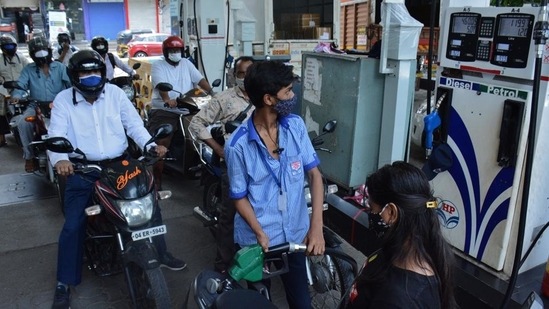What does the fire in global energy markets entail for India?
While crude price has been on an upward trajectory since the end of September, the prices of other energy resources, including natural gas and coal have risen to multi year highs across the globe as demand for energy soars against the backdrop of a massive shortage.
On April 20, 2020, exactly 40 days after the World Health Organisation (WHO) declared Covid-19 as a pandemic, WTI Crude -- the US benchmark for crude oil prices -- fell into negative territory.

As of October 6, WTI was trading at $76.94 per barrel. This underlines the sharp turnaround in global energy markets.
With energy prices on the upswing and the world bracing itself for Brent crude (the global benchmark for petroleum prices) hitting the $90 mark, what are the likely consequences for India?
Broad based spike in energy markets and OPEC playing hardball will keep oil prices high
While crude price has been on an upward trajectory since the end of September, the prices of other energy resources, including natural gas and coal have risen to multi year highs across the globe as demand for energy soars against the backdrop of a massive shortage.
IMF data on global commodity prices (till August ) shows that price of natural gas and coal (represented by their indices) are the highest since the financial crisis in late 2008.
Coal prices have increased across the world, a trend which started from the coal shortage in China.
The price of natural gas has also increased due to lower supplies amid rising demand across developed economies. Bloomberg reported (on September 24) that the surge in natural gas prices is expected to force some consumers in the US to switch to oil.
This, when read with the fact that OPEC+, the cartel of oil producing countries, is refusing to increase crude production to pre-pandemic levels, means that oil prices will continue to face tailwinds.
Rising oil and falling rupee mean higher domestic prices for petroleum products
India imports 81% of crude petroleum and the price it pays is captured by the price of India’s Crude Oil Basket (COB). Although not identical to Brent crude prices, the two move in sync.
Another factor which matters for India’s petroleum import bill is the value of the rupee. For the same dollar rates, the import cost for the domestic economy can vary a lot with exchange rate changes.
Petroleum ministry data shows that India’s COB was priced at $80.49 per barrel on October 5. At the exchange rate of ₹74.53 to a dollar, the rupee price came to ₹5999 per barrel. Crude oil prices have been significantly higher in the past.
India’s COB price was above the $100 per barrel mark between February 2011 and August 2014, but the exchange rate was more favourable then.
This means that the current rupee price is much higher, despite the dollar prices not being as high. With oil prices rising and the rupee falling, domestic prices could increase further.
What does it mean for petrol-diesel and general prices?
This depends on two factors in addition to crude prices: exchange rate and taxes.
A September 29 note by Madan Sabnavis, the chief economist at CARE Ratings expects the exchange rate to be in the range of ₹75-75.5 per dollar “before clarity descends on OPEC+ action”.
The tax impact is a bit more complicated because state and central taxes differ in nature. While bulk of central taxes are fixed and do not change with prices, state Value Added Taxes (VAT) are ad-valorem in nature and the tax burden can increase when base prices rise.
Finance Minister Nirmala Sitharaman flagged this issue in an HT interview on September 21.
“The only very strong case for me to put forward – excise levied by the Centre is not value added; it is fixed. If it were value added, each time the price increases, it goes up. And prices are going up. So, I have to balance this with what’s happening in the states. It’s also a question of time. I won’t be able to comment on it beyond that”, Sitharaman said then in response to a question on high oil prices.
Higher energy prices are likely to generate tailwinds for inflation as well. A research note dated October 5 by Pranjul Bhandari, chief economist at HSBC Securities and Capital Markets (India) Private Limited points that India is amongst the few countries in the region where energy prices have a high correlation with the core Consumer Price Index.
The effect on India’s trade balance
India’s oil imports reached an all-time high of $17.42 billion in the month of September. This is likely to increase as prices rise further. Sabnavis’s note gives some projections on this count.
“India imports around 4.5-5 million barrels per day which for the second half of the year would be 820-910 million barrels. Intuitively $ 10/barrel will mean an increase in the import bill by $ 8.2- $ 9.1 billion for this period. In FY20 the oil bill was $ 130 billion and in FY21 $ 82.4 billion. In the first 6 months of FY22, oil imports were $ 70.5 billion and hence assuming a similar quantum would be imported in the second quarter there would be an increase in the half yearly bill by 11.6% to 12.9%. This will tend to impact the trade deficit too. The trade deficit for the first half was around $ 75.7 billion”, the note says.
Get Current Updates on India News, Lok Sabha election 2024 live, Election 2024 along with Latest News and Top Headlines from India and around the world.








